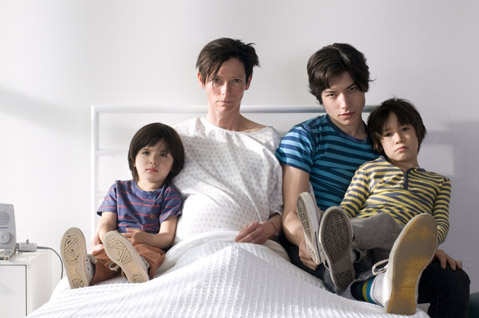We Need to Talk About Kevin
Tilda Swinton, John C. Reilly, and Ezra Miller star in a film written by Lynne Ramsay and Rory Stewart Kinear, based on the novel by Lionel Shriver, and directed by Ramsay.

With her astonishingly fine and chilling film Ratcatcher, probably the best film of 2000, distinctive Scottish filmmaker Lynne Ramsay burrowed into the complex and sometimes cruel inner world of childhood with a strong sense of style. We get some sense of a similar path, under different socio-cultural circumstances, with Ramsay’s powerful and harrowing We Need to Talk About Kevin, with new levels of chill factor attached.
In this fictional anatomy of a high school massacre shooter, based on Lionel Shriver’s novel, Ramsay hits close to home in the American mindset, in a volatile and violent post-Columbine environment. Somewhere between Gus Van Sant’s dreamy, vaguely Columbine-channeling Elephant and a more grittily factual account of a high school massacre, Kevin follows its own unique storytelling path through slow-building, chronologically maze-like maneuvers.
Ramsay, with ample help from Seamus McGarvey’s sentient cinematography and Jonny (Radiohead) Greenwood’s eerily ambient score, manages to put forth a poetic sensibility in the filmmaking, even while it touches nerves in real life, real emotion ways. Leitmotifs of red liquids — assorted sauces, smeared jam, vandals’ paint, actual blood — stream through the film’s visual scheme, while the thematic buzz of evil’s banality arrives regularly, including through creepy trick-or-treaters in the ‘burbs.
We follow the travails of Eve (Tilda Swinton, a bundle of barely restrained nerves) from her hellish post-crime life back and forth in time and spaces, watching her young son, Kevin, grow from hyper-willful rebel child to a teen with nihilistic tendencies (Ezra Miller, who’s spooky cool here). Confronting another senseless act of mischief, Eve asks Kevin “What’s the point?” He smirks, “There is no point. That’s the point.” When she finally asks him “Why?” during a prison visit, his response touches a chord of unexpected poignancy.
For much of the story, essentially a retracing of the troubled childhood of a psychopathic teen killer, Ramsay keeps her cinematic style loose and impressionistic, rather than dwelling on the grit and gore. Instead, the film floats back and forth in time and degrees of realism, befitting the haunting blur of memory and what-if sentiments surrounding a family life turned nightmarish. It’s one of those powerful and boldly realized films you would like to shrug off as “only a movie,” but no such luck.



